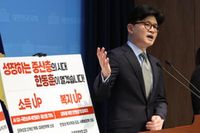SEOUL, April 15 (Yonhap) -- In a bold move to reshape South Korea's future, Han Dong-hoon, the former leader of the People Power Party, officially announced his candidacy for the upcoming presidential election set for June 3, 2025. During a press conference at the National Assembly, Han unveiled an ambitious plan aimed at positioning South Korea as one of the top three artificial intelligence (AI) powerhouses globally, with a staggering investment proposal of 200 trillion won (approximately US$140.7 billion).
Han's vision includes a significant allocation of 150 trillion won towards building robust AI infrastructure, while the remaining 50 trillion won would focus on fostering a supportive ecosystem for AI development. "The AI revolution has just begun, and our goal to become one of the top three AI powers is a prerequisite for advancing into the future," Han stated, emphasizing the importance of strategic investments in sectors such as medical AI, robotics, defense AI, drones, and autonomous driving.
In addition to his focus on AI, Han pledged to elevate South Korea's gross national income (GNI) to US$40,000 per capita and expand the middle class to encompass 70 percent of the population. "Even with a national income of $40,000, if taxes feel excessive, life will still be challenging," he remarked, promising to reduce the burden of income tax while expanding tax deductions for families with dependents.
Han's welfare reform plans include the establishment of a new deputy prime minister-level department dedicated to overhauling the welfare system, along with an expansion of the "Neulbom School" program, which integrates before- and after-school care with educational initiatives.
During his campaign launch, Han also set his sights on defeating Rep. Lee Jae-myung, the current frontrunner and former leader of the liberal Democratic Party of Korea. Han's aspirations come in the wake of a turbulent political landscape, following the recent removal of former President Yoon Suk Yeol by the Constitutional Court.
Han's commitment to the middle class is underscored by his promise to enhance tax benefits and job creation. He plans to increase the standard income tax deduction from 1.5 million won (around $1,055.62) to 2 million won per person and to raise tax deductions for households with children. Additional benefits for parental leave are also on the agenda, as Han aims to create a more family-friendly tax system.
Moreover, he proposed a significant overhaul of the inheritance tax system, shifting from taxing the entire estate to taxing each inheritor's individual share. This change aims to alleviate the financial burden on families during sensitive times.
To stimulate job creation, Han vowed to implement a comprehensive welfare system that would assist individuals in finding suitable employment tailored to their needs and interests. "If we’re targeting to become one of the top three countries, 150 trillion won investment in data centers, computing hardware, and semiconductors for the next five years is not excessive," he asserted, positioning his investment as a critical component of his broader economic strategy.
Han's plans come at a time when South Korea's journey toward achieving a GNI per capita of $40,000 has faced challenges. While the nation has surpassed the GNI of Japan and Taiwan for two consecutive years, its per capita income was reported to be $36,624 in 2024, remaining stagnant within the $30,000 range for over a decade.
As the political landscape shifts, Han's candidacy marks a pivotal moment for the People Power Party, which has recently undergone significant changes following the impeachment of former President Yoon. Han's relationship with Yoon dates back over 20 years, having collaborated as prosecutors in high-profile cases against previous presidents. However, tensions have surfaced between the two, particularly regarding Yoon's handling of controversies surrounding his wife, Kim Keon Hee.
With the early presidential election approaching, Han Dong-hoon is positioning himself as a reformative candidate focused on leveraging technology and economic growth to uplift the middle class and secure South Korea's place in the global AI landscape. His campaign promises reflect a commitment to innovation, economic stability, and a renewed focus on the welfare of South Korean citizens.
As the election date draws near, all eyes will be on Han and his proposals, as they could reshape the future of South Korea's economy and its standing in the global technological arena.




